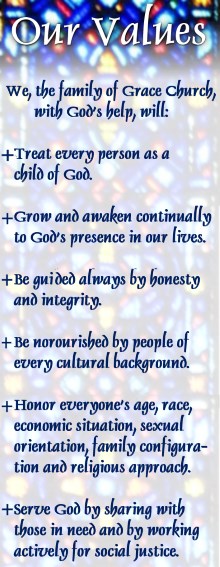From the Grace Church Health and Wellness Committee, September 2007
The theme for September is physical activity. In a recent published report, nearly one quarter of adults indicated no leisure-time activity at all and less than one half of adults met 1995 American College of Sports Medicine (ACSM) guidelines for physical activity. The American College of Sports Medicine and the American Heart Association (AHA) recently updated their recommendations regarding physical activity for adults. In brief, they reaffirmed their belief, based upon research, that regular physical activity is another key element to good health. They also recommended that more strenuous activity more frequently, is even better for your health than had been a part of their earlier recommendations.
Specifically, ACSM and AHA recommend that “all healthy adults aged 18 to 65 years need moderate-intensity aerobic physical activity for a minimum of 30 minutes on five days each week or vigorous-intensity aerobic activity for a minimum of 20 minutes on three days each week.”
Regular physical activity should consist of both aerobic exercise (e.g., brisk walking, swimming, biking, jogging, or dancing) and resistance exercise (e.g., weight training, push-ups, or elastic bands).
This is not an all vs. nothing-at-all proposition. The ACSM and AHA recognize that combinations of these recommendations are also acceptable. For instance, you might choose to meet these recommendations by walking briskly, biking or doing any other activity that noticeably increases your heart rate and breathing for a minimum of 30 minutes twice a week and then jogging for 20 minutes, or doing another activity that causes you to breath rapidly and substantially increases your heart rate on two other days of the same week. Your doctor and other health care providers are the best sources of information about which forms of regular physical activity, how often and how much are best for you and/or your child.
Let us look more closely at the similarities and differences, benefits and risks of aerobic exercises and strength-building exercises.
- Aerobic Exercise: In general, aerobic exercises are ones that involve the use of major muscle groups (e.g., legs, back and arms), engaged in continuously for longer periods of time (minimum of 20 minutes). Walking, jogging, biking, rowing, swimming at an intensity that noticeably or substantially increases your heart rate and breathing. Among the recognized benefits of doing regular aerobic exercise are: strengthening the muscles involved in breathing, strengthening and enlarging the heart muscle, and toning muscles throughout the body. Musculoskeletal injury (e.g., pulled or strained muscle) is the most probable risk associated with aerobic exercises (e.g., leisure time sports). A second risk, that of sudden cardiac arrest, has a very low probability in generally healthy adults while engaging in moderate intensity exercises.
- ·Resistance Exercise: Resistance exercises repeatedly (e.g., 8 – 12 repetitions) pit the muscles against a weight or force. It is recommended that 8 – 10 different exercises be performed on two or more non-consecutive days each week using the major muscles of the body. Over time, the muscles are likely to respond to the extra workload by getting stronger and increasing endurance. Resistance or muscle strengthening activities include a progressive weight training program, weight bearing calisthenics, stair climbing, and similar resistance exercises that use the major muscle groups. Musculoskeletal injury (e.g., pulled or strained muscle) is the most probable risk associated with resistance exercises as well. It is important to pay attention to safety, good posture and body positioning (form) to reduce the risk of injury.
Should you have concerns or want additional information about the material presented above, please contact your local health care provider, public health department or someone on the Grace Church Health and Wellness Ministry Committee. This Committee is chaired by Mrs. Florence Poyer, R.N.
Prepared by: Walter S. Handy, Ph.D., Member, Grace Episcopal Church Health and Wellness Ministry Committee



No comments:
Post a Comment